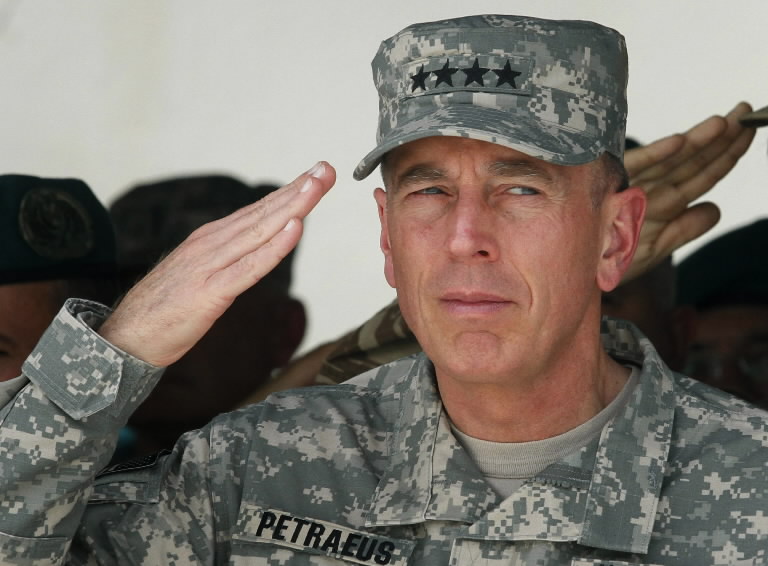Reconsidering The Petraeus Hagiography
The scandal now surrounding David Petraeus should lead people to reassess his past record.
Much of the commentary that has surrounded the departure of David Petraeus from the Central Intelligence Agency due to a sex scandal has included at least some mention of how the retired General has tarnished what was otherwise an impeccable legacy due to a personal foible. It’s certainly true that Petraeus’s reputation as a General was amazingly high. Indeed, he may have been the most popular military commander in recent memory during the time that he was in the field, on a par in popularity with Colin Powell and Norman Schwarzkopf and arguably more skilled than both of them. As the story goes, he’s the man who successfully led the 101st Airborne Division during the invasion phase of the Iraq War, saved that war with the surge in 2007, and then did the same thing in Afghanistan three years later. He was mentioned several times as a possible candidate for President or, more recently, as Mitt Romney’s running mate on the 2012 Republican ticket. There were very few people in American government who were regarded as highly as David Petraeus.
In the wake of the scandal, and the news that Petraeus was allowing unusually close access not only to Broadwell but also to other members of the press and, most interesting, a host of Washington-based conservative think tanks that would embed with his command staff and even be granted the use of military aircraft, some people are reconsidering the Peteraeus legend and finding it wanting. Spencer Ackermann, for example, wrote yesterday about how he had found himself drawn into what he refers to as the David Petraeus cult:
The first time I met Petraeus, he was in what I thought of as a backwater: the Combined Armed Center at Fort Leavenworth. It’s one of the Army’s in-house academic institutions, and it’s in Kansas, far from the battlefields of Iraq and Afghanistan. In 2005, Petraeus ran the place, and accepted an interview request about his tenure training the Iraqi military, which didn’t go well. Petraeus didn’t speak for the record in that interview, but over the course of an hour, he impressed me greatly with his intelligence and his willingness to entertain a lot of questions that boiled down to isn’t Iraq an irredeemable shitshow. Back then, most generals would dismiss that line of inquiry out of hand, and that would be the end of the interview.
One of Petraeus’ aides underscored a line that several other members of the Petraeus brain trust would reiterate for years: “He’s an academic at heart,” as Pete Mansoor, a retired Army colonel who served as Petraeus’ executive officer during the Iraq surge, puts it. There was a purpose to that line: It implied Petraeus wasn’t particularly ambitious, suggesting he was content at Fort Leavenworth and wasn’t angling for a bigger job. I bought into it, especially after I found Petraeus to be the rare general who didn’t mind responding to the occasional follow-up request.
So when Petraeus got command of the Iraq war in 2007, I blogged that it was all a tragic shame that President Bush would use Petraeus, “the wisest general in the U.S. Army,” as a “human shield” for the irredeemability of the war. And whatever anyone thought about the war, they should “believe the hype” about Petraeus.
I wasn’t alone in this. Petraeus recognized that the spirited back-and-forth that journalists like could be a powerful weapon in his arsenal. “His ability to talk to a reporter for 45 minutes, to flow on the record, to background or off-the-record and back, and to say meaningful things and not get outside the lane too much — it was the best I’ve ever seen,” Mansoor reflects. It paid dividends. On the strength of a single tour running the 101st Airborne in Mosul, Newsweek put the relatively unknown general on its cover in 2004 under the headline “Can This Man Save Iraq?” (It’s the first of three cover stories the magazine wrote about him.) Petraeus’ embrIn ace of counterinsurgency, with its self-congratulatory stylings as an enlightened form of warfare that de-emphasized killing, earned him plaudits as an “intellectual,” unlike those “old-fashioned, gung-ho, blood-and-guts sort of commander[s],” as Time‘s Joe Klein wrote in 2007. This media narrative took hold despite the bloody, close-encounter street fights that characterized Baghdad during the surge.
Ackermann goes on to note Petraeus’s overwhelmingly positive press coverage during the time he was in command and the role that Petraeus’s staff, which stayed in close contact with the reporters that covered him, playing in shaping the media narrative:
There was another element at work: Counterinsurgency seemed to be working to reduce the tensions of Iraq’s civil war, as violence came down dramatically that summer. So when I got the occasional push-back e-mail from Petraeus’ staff that my reporting was too negative or too ideological, I feared they had a point. And I got exclusive documents from them that — surprise, surprise — not only vindicated Petraeus but made the general seem driven by data and not ideology.
To be clear, none of this was the old quid-pro-quo of access for positive coverage. It worked more subtly than that: The more I interacted with his staff, the more persuasive their points seemed. Nor did I write anything I didn’t believe or couldn’t back up — but in retrospect, I was insufficiently critical. And his staff never cut off access when they disagreed with something I’d written. I didn’t realize I was thinking in their terminology, even when I wrote pieces criticizing Petraeus. A 2008 series I wrote on counterinsurgencywas filled with florid descriptions like “Petraeus is no stranger to either difficulty or realism.“
In other words, without anyone actually realizing it, Petraeus, or at least his staff, was running a very sophisticated public relations campaign that helped to perpetuate the media myth that had developed around the General and created an environment where the reporters covering him came to believe the myth rather than question it. Whether this was consciously Petraeus’s work or not is unclear. After all, it’s not uncommon for a Commanding Officer’s staff to protect their leader and take steps to burnish his legacy. At the same time, though, the extent of the Petraeus myth making over the course of the years, and the numerous times that he himself developed closed relationships with journalists and academics, most notably of course with Paula Broadwell, suggests that Petraeus was well aware of the myth-making that had developed around him and was an active participant in it. That, perhaps, is why so many people believed, despite his protestations, that he had a political career in mind for his future.
Bernard Finel touches on that point in his comments about the entire Petraeus-Broadwell relationship, which he points out is about a lot more than just sex:
It wasn’t a private affair. Broadwell wasn’t some random family friend. She was his de factoofficial biographer. He’d used his position, first in the military and then at CIA, to enhance her visibility and reputation precisely because she was able and willing to burnish his public image. Petraeus’ conduct with Broadwell was abhorent even before he had sex with her. He used government resources to promote himself personally and to leverage that popularity in order to back elected officials into a corner in order to get what he wanted both in terms of policy and in terms of personal advancement. This is a public affair and it speaks directly to Petraeus’ abuse of power and position throughout the last decade.
I’ll also note that many of his defenders, particularly those trotting out the “private affair” line of argumentation are similarly compromised. Ricks, Boot, Andrew Exum, Mike O’Hanlon, and many others were all part of the same dirty little quid-pro-quo, where they got career boosts and access in return for building up the Petraeus cult.
Again, this is not a private affair. Broadwell was part of a general pattern of abuse of power and violation of civil-military norms by David Petraeus. Focusing on the sex is just a nice way to deflect from the deeper corruption here.
The fact that virtually nothing was said about this while it was going on is, if nothing else, a testament to how firmly the Petraeus myth had taken hold of many of the journalists who covered the military for a living. Rather than asking the questions they should have, these people found themselves caught up in the same kind of hero worship that drew Broadwell to Afghanistan and, eventually, into a relationship with Petraeus.
Beyond the hagiography, though, there are other reasons to be concerned about Petraeus’s legacy. For example, as Robert Wright points out, there’s the militarization of the Central Intelligence Agency:
When, in the fall of 2011, David Petraeus moved from commanding the Afghanistan war effort to commanding the CIA, it was a disturbingly natural transition. I say “natural” because the CIA conducts drone strikes in the Afghanistan-Pakistan region and is involved in other military operations there, so Petraeus, in his new role, was continuing to fight the Afghanistan war. I say “disturbingly” because this overlap of Pentagon and CIA missions is the result of a creeping militarization of the CIA that may be undermining America’s national security.
This trend was clear during the Bush administration, but it accelerated under President Obama, who greatly expanded drone strikes, and it reached a kind of symbolic culmination when Obama nominated this four-star general to run things at Langley. That would have been the perfect time to reflect on the wisdom of the convergence of the CIA’s and Pentagon’s jobs. But, instead, the network of journalists, think tankers, public officials and others who constitute the foreign policy establishment preserved their nearly unblemished record of not focusing on the biggest questions.
(…)
I think history is going to judge American foreign policy in the Bush-Obama years harshly. And I think a big reason is that we’re missing a fleeting opportunity to help build a world civilization based on widely respected laws and norms. Shortly after 9/11, with the US holding the attention and sympathy of the world, it had the opportunity to start doing this. President Bush failed–by, to pick just one of many examples, attacking Iraq without having international law on his side.
I wish I could say that President Obama has done a whole lot better than Bush. And, in Obama’s defense, he did get UN Security Council authorization before intervening in Libya (leaving aside the question of whether the intervention ultimately exceeded the UN mandate). But in many ways this president is no improvement over the last one, and Exhibit A is the acceleration of a far-flung drone-strike program that is shrouded in the secrecy of the CIA. The vision implicit in this program is of an America whose great calling is to lead the world into a future of chaos and lawlessness.
This prospect was vividly highlighted when, a bit more than a year ago, Obama had David Petraeus turn in his stars so he could move to the CIA and keep fighting wars. There have been other military men who headed the CIA, but never has there been one whose move to Langley brought so much continuity with what he was doing before he went there.
None of this is to say that Petraeus was a bad General. The evidence to the contrary on that point is far too voluminous to ignore. However, it should have been clear even when he was in the field that the man did not measure up to the myth, they never do after all, and that our media was doing us a disservice by buying into it.






A useful rule of thumb is that if the media is lionizing somebody that means they’re not all that; vice-versa, too.
Holly Patraeus:
http://cdn.thedailybeast.com/content/dailybeast/articles/2012/11/10/holly-petraeus-the-woman-behind-the-general/_jcr_content/body/inlineimage.img.503.jpg/1352606709493.cached.jpg
Paula Broadwell:
http://milblogging.com/popups/images/paula-broadwell-general-david-petraeus-biographer.jpg
The math here is pretty simple…
Speaking of hero worship……..
I have no issue with this being more than a sex scandal, or some portion of media types being under a spell…but
Can anyone tell me how the FBI was investigating the head of the CIA and the White House knew nothing until the day after the election. And the White House also bought into a notion of a video being the cause of a terrorist (“folks” as some call them) attack and murder of an Ambassador?
The term “hero worship” looks tame compared to that.
My impression of Petraeus was always of a very ambitious man who surrounded himself with a PR operation. Bernard Finel pointed this out years ago. His surge in Iraq failed to produce the political stability that was supposed to be it’s purpose. The same can be said for Afghanistan. Of course he never got the resources that his own COIN theory required so we will never know if it was right or wrong.
@Ron Beasley:
This is true, but I’m not sure that the nation would have really supported the kind of commitment, either in Iraq or Afghanistan, that would have been required to really implement COIN as Petraeus envisioned it.
New York Magazine nails it…it’s a “Love Pentagon”
Idiots run our country. In other words they are just like the rest of us. No better…no worse…just the same.
I think that Pat Lang’s take is worthy of some consideration:
He goes on to criticize, as an informed critic, Petraeus’s actions in Iraq and Afghanistan.
@Doug Mataconis: I agree and in fact I don’t believe the resources were even available. It would have required a Vietnam like commitment which would have included a draft.
@C. Clavin:
The math was:
Petraeus’s ego > his love for his wife.
Yes, remember when Move On ran that “Betray Us” ad in the NYT? The howls of outrage from members of the press corps — not Republicans in Congress, not members of the military, but reporters and pundits — sounded like the baying of a lynch mob. You would have thought they’d advocated the anal rape of the Virgin Mary, instead of questioning a general. It would have been nice if one or two of these intrepid watchdogs might have noticed and considered examining their assumptions — but they were too busy chasing infidels away from the temple of St. Petraeus.
Wow…someone down-voted me because I’m shallow. That hurts. Well, not really.
@Drew: @Dave Schuler:
There’s actually quite a bit of reporting on the tick-tock. No one dropped a dime on anyone. There’s nothing terribly fishy here unless it’s the FBI agent’s outreach to Eric Cantor. . . except that turns out to be the FBI agent reaching out to a completely separate Congressman he knew, which then ended up getting to Cantor. So nothing.
It’s just sex. Sorry. Nothing about Obama, nothing about anything, really. No big implications except for the deleterious impact on military morale and training. It’s just sex.
@michael reynolds:
My impression is that FBI investigator was a bad actor in all of this: Pushing a cyber crime investigation, as a favor to his socialite friend, over e-mails his fellow agents found unworthy their time (not at all threatening); constantly sniffing around an investigation he wasn’t a part of until his superiors told him to back-T-F off; leaking details of the investigation to Kelly, who informed Petraeus, who informed Broadwell; leaking to another pal of his, Rep. Reichert, a byproduct of the investigation he wasn’t even assigned to, the most personal of details about Gen. Petraeus’ behavior, apparently because of his right-wing “world view.”
It’s hard not to see this guy as some sort of rogue FBI agent, taking advantage of his trusted position, using that power to dole out favors and leaking personal information to his partisan friends.
@C. Clavin
No, it’s not because you are shallow. People just to down-vote you because you are a dick. 🙂
@Jeremy R:
That’s roughly my impression as well. When it all sorts out it looks like a series of personnel issues. Petraeus violated at least the norms of the CIA. The FBI agent used his position to do a favor for the socialite and was then so anxious to continue currying favor that he made a nuisance of himself.
The idea of a security breach is being batted down. Which means, no, it’s not a big deal that Obama wasn’t told immediately or that Diane Feinstein wasn’t told or that we weren’t told. There is no evidence that any of this matters beyond the personnel issues and the effect on military morale of having General “Character is what you do when no one’s watching” Petraeus screwing his biographer.
The Republican fantasy that if only this had come out a week earlier 3,000,000 votes would have flipped is so pathetic it actually makes me feel kind of sorry for them.
@ Tim…
Ouch that hurt. Well…not really.
@ Reynolds…
I think what matters is that based on the exchange of a few high school emails the privacy of a lot of people were invaded. Careers were ruined. No way this overzealous dweeb who sent the picture of himself without a shirt should be able to do so much damage.
We see this crap all the time in the lives of normal people. Cops who wield too much power…who can mess up your life because they are having a bad day.
I think there is a big-picture libertarian police-state story here.
But that will get lost in the shuffle.
Hagiography early warning sign: Broadwell wrote a doctoral thesis about Petreaus *and* the general was one of her thesis advisors.
@wr: Yes, remember when Move On ran that “Betray Us” ad in the NYT? The howls of outrage from members of the press corps — not Republicans in Congress, not members of the military, but reporters and pundits — sounded like the baying of a lynch mob. You would have thought they’d advocated the anal rape of the Virgin Mary, instead of questioning a general.
Nice rewriting of history. Let’s look at the actual ad. Published before Petraeus was to give his testimony, MoveOn.org specifically and explicitly called Petraeus a liar for statements he had yet to make.
And members of the press corps howled? More bullshit. The New York Times actually gave MoveOn.org a hefty discount on the ad — over 50%. They had to submit a followup bill to avoid having the discount considered a “contribution in kind” to the whackjobs at MoveOn.
But hey, you at least brought it up, so you get some credit…
@Jenos Idanian #13:
Oh, look Jay, you forgot to link to that story. So I’ve done it for you:
So, because the organization asked for a specific pub date it was not entitled to the discount rate. And that’s the conspiracy. So glad I could clarify that for you.
@michael reynolds:
Sexytime is what you do when no one is watching.
Unless you’re into being watched.
There’s nothing really new about this. My father was with 5th Army in Italy during the war and it was well known Clark was obsessed with his media image. He allowed the German army to escape to get a headline. And does anyone really need to mention MacArthur another once and future Republican candidate for president who allegedly walked on water but was really a posturing windbag albeit personally brave. Petraeus was and is a competent, intelligent, articulate and dedicated officer who kept his image burnished. I don’t see anything wrong with this since mythmaking has always been part of military leadership . On the other hand he wasn’t the second coming of Manstein, Moltke or Zhukov and of the two wars in which he played a major role one was a failure and the other is a messy stalemate. It’s also fair to say his foolishness has done serious damage to the reputation of the US military.
@Drew: We could tell you but are you sure you’d understand it, because the answer is in the reports from the start? The FBI was investigating a complaint of threats from someone who was using Petraeus’ email account. What is so odd about that? Of course the powers used are probably the same ones granted by the “Patriot Act” a nice bit of poetic justice for one of its supporters I’d say, and no doubt those powers were being abused somewhat…just like they are for everyone else hit by them.
As an Aussie it amuses me that I should be the one to explain to you the most basic reason why the FBI and can be investigating anyone in the CIA if needed.
*sigh* The CIA operates outside US borders. The FBI is responsible for what goes on inside those borders.
@C. Clavin: Speak for yourself, they are much worse than anyone I know.